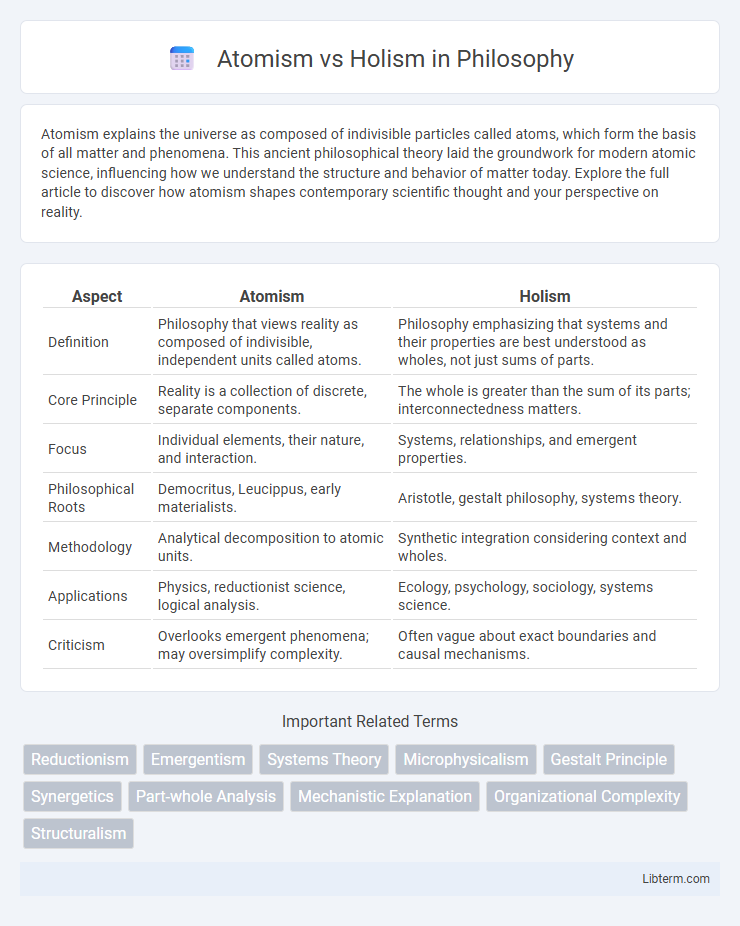Atomism explains the universe as composed of indivisible particles called atoms, which form the basis of all matter and phenomena. This ancient philosophical theory laid the groundwork for modern atomic science, influencing how we understand the structure and behavior of matter today. Explore the full article to discover how atomism shapes contemporary scientific thought and your perspective on reality.
Table of Comparison
| Aspect | Atomism | Holism |
|---|---|---|
| Definition | Philosophy that views reality as composed of indivisible, independent units called atoms. | Philosophy emphasizing that systems and their properties are best understood as wholes, not just sums of parts. |
| Core Principle | Reality is a collection of discrete, separate components. | The whole is greater than the sum of its parts; interconnectedness matters. |
| Focus | Individual elements, their nature, and interaction. | Systems, relationships, and emergent properties. |
| Philosophical Roots | Democritus, Leucippus, early materialists. | Aristotle, gestalt philosophy, systems theory. |
| Methodology | Analytical decomposition to atomic units. | Synthetic integration considering context and wholes. |
| Applications | Physics, reductionist science, logical analysis. | Ecology, psychology, sociology, systems science. |
| Criticism | Overlooks emergent phenomena; may oversimplify complexity. | Often vague about exact boundaries and causal mechanisms. |
Introduction to Atomism and Holism
Atomism is a philosophical concept asserting that reality consists of discrete, indivisible units called atoms, which combine to form complex structures. Holism, in contrast, emphasizes that systems and their properties must be understood as wholes, not merely as collections of parts. These opposing perspectives influence various fields, including science, psychology, and philosophy, shaping how phenomena are analyzed and interpreted.
Historical Foundations of Atomism
Atomism originated in ancient Greece, primarily through the works of Leucippus and Democritus, who proposed that all matter consists of indivisible particles called atoms. This foundational concept contrasted with earlier continuous theories of matter, asserting that atoms move through the void and combine to form diverse substances. The historical significance of atomism lies in its influence on modern scientific methods and the development of atomic theory in physics and chemistry.
Roots and Development of Holism
Holism emerged from early philosophical traditions emphasizing the interconnectedness of systems, notably influenced by Aristotle's concept that "the whole is more than the sum of its parts." The development of holistic thought advanced through Gestalt psychology in the early 20th century, which highlighted perception as an integrated whole. Contemporary holism integrates principles from systems theory and ecology, underscoring the intrinsic interdependence within biological and social structures.
Core Principles of Atomism
Atomism posits that reality is composed of indivisible, discrete units called atoms, which serve as the fundamental building blocks of matter and existence. Each atom operates independently, possessing intrinsic properties that determine the characteristics of complex structures when combined. This principle emphasizes reductionism, asserting that understanding the smallest parts fully explains the whole system's behavior.
Essential Concepts of Holism
Holism emphasizes the interdependence and interconnectedness of all parts within a system, asserting that the whole is more than the sum of its parts. Essential concepts include the recognition of emergent properties arising only when components function collectively, and the importance of context and relationships in understanding phenomena. This approach contrasts with atomism, which analyzes systems by breaking them down into isolated, fundamental units.
Atomism vs Holism in Philosophy
Atomism in philosophy emphasizes that reality consists of indivisible, fundamental units called atoms, which combine to form complex structures, explaining phenomena through these basic building blocks. Holism argues that systems and their properties must be understood as wholes, not merely as a collection of parts, asserting that the interactions and relationships within a system define its nature. The debate between atomism and holism shapes perspectives on knowledge, metaphysics, and the nature of existence, influencing various philosophical disciplines such as epistemology and ontology.
Scientific Perspectives: Atomism and Holism
Scientific perspectives on atomism emphasize analyzing complex phenomena by breaking them into fundamental, independent units such as atoms or particles, enabling detailed study of constituent parts. Holism, in contrast, stresses that systems and their properties cannot be fully understood through an examination of parts alone, advocating for an integrated approach that considers interactions and emergent behaviors within the whole. Research in fields like physics, biology, and cognitive science often balances atomistic reductionism with holistic frameworks to explain intricate natural processes more comprehensively.
Atomism and Holism in Psychology
Atomism in psychology emphasizes breaking down mental processes into basic, discrete elements to understand complex behavior, often associated with structuralism and behaviorism. Holism, contrastingly, views psychological phenomena as integrated wholes that cannot be fully understood by analyzing component parts alone, highlighting approaches like Gestalt psychology and humanistic theories. Both perspectives influence cognitive, developmental, and social psychology by shaping methodologies and interpretations of mental functions.
Applications in Modern Systems Thinking
Atomism in modern systems thinking emphasizes analyzing individual components of a system to understand its functionality, often applied in computer science and mechanical engineering for modular design. Holism prioritizes the interrelationships and emergent properties of system components, widely used in ecology, healthcare, and organizational management to address complex adaptive systems. Combining atomistic and holistic approaches enables more effective problem-solving and innovation in multidisciplinary fields.
Choosing Between Atomism and Holism: A Comparative Analysis
Choosing between atomism and holism requires analyzing their approaches to understanding complex systems; atomism breaks down systems into individual components to study their properties, while holism emphasizes the interdependence of parts within the whole. Scientific disciplines such as biology and social sciences often blend both perspectives, recognizing that isolated components might not reveal emergent properties observable only through a holistic lens. Evaluating context-specific goals and the nature of the subject matter guides whether atomistic reductionism or holistic synthesis offers more accurate insights.
Atomism Infographic

 libterm.com
libterm.com